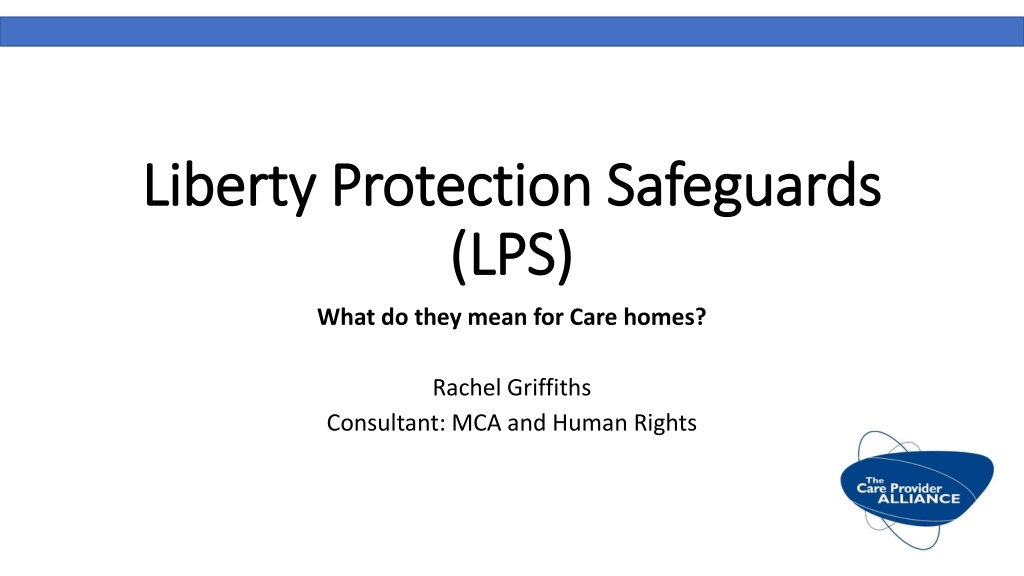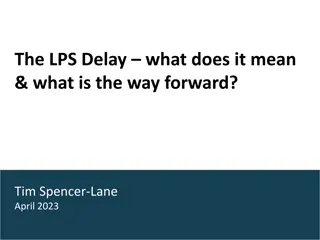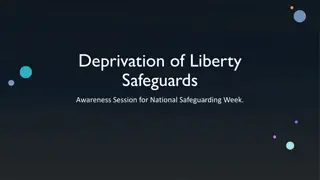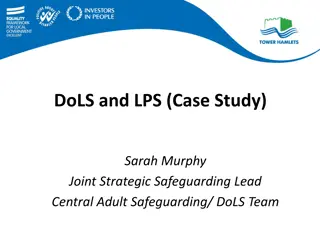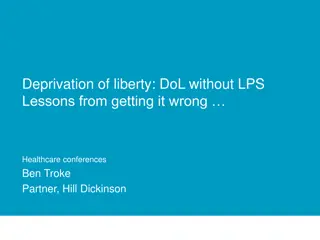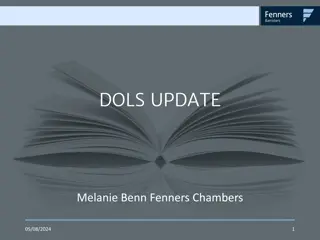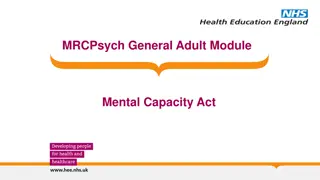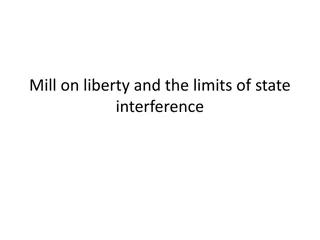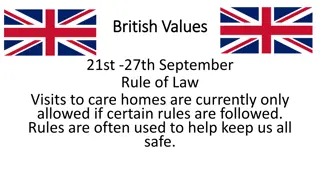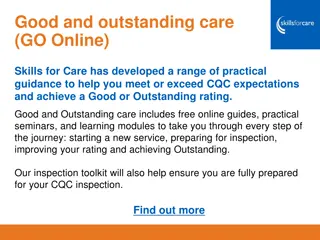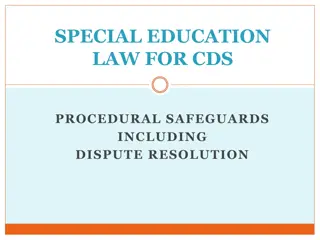Understanding Liberty Protection Safeguards (LPS) for Care Homes
Liberty Protection Safeguards (LPS) bring changes in how the rights of individuals lacking capacity are protected in care homes, replacing Deprivation of Liberty Safeguards (DoLS). LPS applies when a person lacks capacity to consent to necessary care arrangements, ensuring their liberty is safeguarded. Care providers must comply with the Mental Capacity Act for individuals aged 16 and above. The essence of deprivation of liberty and the need for effective supervision are emphasized to prevent restrictions on individual freedom.
Download Presentation

Please find below an Image/Link to download the presentation.
The content on the website is provided AS IS for your information and personal use only. It may not be sold, licensed, or shared on other websites without obtaining consent from the author. Download presentation by click this link. If you encounter any issues during the download, it is possible that the publisher has removed the file from their server.
E N D
Presentation Transcript
Liberty Protection Safeguards Liberty Protection Safeguards (LPS) (LPS) What do they mean for Care homes? Rachel Griffiths Consultant: MCA and Human Rights
What we will cover today about Liberty What we will cover today about Liberty Protection Safeguards (LPS) Protection Safeguards (LPS) What is going to happen and when? What will LPS mean for managers of care homes? What can we do now to be ready? Resources and reasons not to panic
What will happen? What will happen? The way we protect the rights of people who need to be deprived of their liberty will change from deprivation of liberty safeguards (DoLS) to liberty protection safeguards (LPS)
Only applies to people who lack capacity Only applies to people who lack capacity All providers must work within the Mental Capacity Act when people using the service are 16+ and lack capacity Capacity is ALWAYS decision and time specific can this person make this decision at the time it is needed? LPS will only apply when someone lacks capacity to consent to the arrangements or care plan needed to give them essential care or treatment; and These arrangements amount to a deprivation of the person s liberty
What is deprivation of liberty? What is deprivation of liberty? Acid test Someone lacking capacity is deprived of their liberty if they are: Under complete and effective supervision and control (not necessarily line of sight but staff or carers know what they re doing & where) and Not free to leave (meaning, not free to go and live somewhere else) However good the care plan, a gilded cage is still a cage Lady Hale, Supreme Court Cheshire West case [2014] UKSC 19
A gilded cage is still a cage A gilded cage is still a cage
Protections for people deprived Protections for people deprived of liberty of liberty If someone is deprived of their liberty, the LPS process makes sure that There is no less restrictive option available The person really does have a mental disorder and lack capacity for these decisions The plans to give them the care or treatment they need are both necessary and proportionate LPS, like DoLS, gives the person the right to challenge these arrangements, through the system or to the Court of Protection
Deprivation of liberty and Deprivation of liberty and restraint restraint The MCA defines restraint as Using, or threatening, force to make someone do something they are resisting or Restricting their freedom of movement whether they resist this or not There are always restraints in a deprivation of liberty, but an individual restraint is not of itself deprivation Recognise and record restraint; always ask yourself if it is necessary to prevent harm to this person, and a proportionate response See MCA code of practice chapter 6
Whats NEW (1) What s NEW (1) The headlines Lots of people were missing out on these protections DoLS only apply in care homes and hospitals; LPS will apply in all settings, including supported living and people s own homes DoLS apply from age 18 upwards; LPS from age 16
Whats New (2) What s New (2) LPS system is intended to be SIMPLER than DoLS fewer weird rules , less jargon, less bureaucratic more flexible and intuitive (and cheaper) can be extended more easily and for longer can cover different settings and transport, if this is planned
Whats new 3: What s new 3: 3 assessments for LPS 3 assessments for LPS 1 Does the person lack mental capacity to consent to the arrangements? (assessed by doctor, SW, OT, psychologist, nurse or SALT) 2 Do they have a mental disorder? (doctor or psychologist) 3 Are the arrangements necessary to prevent harm to this person and proportionate to the likelihood and seriousness of harm to them? (same assessors as 1) This final assessment is called Necessary and Proportionate , N & P It is at the heart of deciding if this level of restriction is justified.
What will it mean for different What will it mean for different providers? providers? Supported living, Shared Lives settings, home care, services for 16/17s Currently commissioners/LAs apply to Court of Protection if someone is deprived of their liberty Providers will have to learn to work within new process Sometimes a learning curve about the wider MCA Will not have to arrange or carry out assessments / authorisations
What about care homes? What about care homes? Already familiar with DoLS: similar in many ways, often simpler Need to know how to recognise restraint, what is deprivation of liberty, how will LPS work and where to find out more information Like other care providers, will not be responsible for assessments and decision-making within LPS
The vital purpose remains The vital purpose remains Both DoLS and LPS protect the human rights of people who Lack capacity to consent to the arrangements to give them the care or treatment that they need; and Those arrangements amount to deprivation of liberty, but are In their best interests, and necessary to prevent harm to them, and a proportionate response to how likely / serious that harm would be Both systems also protect staff from liability who are depriving someone of their liberty when there is no less restrictive option
How do LPS protect the persons How do LPS protect the person s rights? rights? Sometimes you have to deprive someone of their liberty, to keep them safe from serious harm, to give them the care or attention they need. These Safeguards make it easier to Identify when someone is or will be deprived of liberty Arrange checks on whether they do lack capacity to make this decision, do have a mental disorder, and whether the arrangements are necessary and proportionate. Give them a right to challenge, to the Responsible Body or to the Court of Protection.
Transition year from DoLS to LPS Transition year from DoLS to LPS From LPS implementation day, there can be no new DoLS Anyone on a DoLS authorisation on implementation day will stay on it, unless it is challenged, until it expires After that, switch to LPS (might use some existing assessments) So DoLS will dwindle in number; after a year (max. authorisation period) no DoLS, only LPS
Responsible body for care homes: Responsible body for care homes: local authority (like now) local authority (like now) LPS will be run by Responsible Bodies, who are The hospital manager, when the person s care is mainly provided by an NHS hospital (in Wales: Health Boards, like DoLS now) The Clinical Commissioning Group (in future Integrated Care Board) if the person s main care is NHS Continuing Health Care: (in Wales: Health Boards) The local authority for all care homes and community settings, and also for independent hospitals (in Wales: that s right, Health Boards)
LPS less rule LPS less rule- -based based Anyone can refer a potential dol to the RB Authorisation can last up to 3 years if situation is stable Can cover a range of settings own home, hospital stay, day care, respite - if pre-planned Existing assessments can be used if relevant; care planning includes LPS from the start (e.g. Care Act) No urgent authorisation : instead, protection from liability if either it s an emergency or authorisation has been requested
Some new situations Some new situations If the person receives CHC in England, the Responsible Body is not the LA but is the Integrated Care Board (taking over from CCG) If a person s main care is provided by an NHS hospital, but, say, they are in step down to a care home, the RB remains the Trust running that NHS hospital If a person is cared for at home but comes to a care home for day care or respite, a single authorisation can cover or not all these settings, plus transport. Must think, is THIS care plan for THIS person HERE a dol?
S4B instead of urgent S4B instead of urgent Four conditions: Purpose of dol is to give life-sustaining treatment or a vital act Steps taken are necessary to achieve this Decision-maker believes the person lacks capacity to consent to these steps Application to Court or to RB for LPS authorisation is under way OR there is an emergency
When will LPS start? When will LPS start? No definite date See next slide for government time-line Probably not before Autumn 2023 maybe early 2024 Timetable allows for at least 6 months pre- implementation training, this will start after next winter
Government time Government time- -line for LPS line for LPS
Public consultation on MCA code Public consultation on MCA code and LPS and LPS A revision of the existing MCA code updates and clarifications plus chapters on LPS and regulations for England and Wales Many documents and a useful summary. In places the draft is unclear or seems contradictory Let government know your thoughts about how this will work in practice and what is clear and what is confusing See link to consultation documents in Resources
Code unclear about what is a dol Code unclear about what is a dol Chapter 12 of draft Code: uses acid test but scenarios seem to stretch this very far Do not rely on the draft Code in decision-making about deprivation of liberty For the time being we have DoLS, contact your LA DoLS team if you are in doubt Ultimately not your decision: currently SB, in future RB!
Government Training Triangle Government Training Triangle
To be ready (1) To be ready (1) Put the MCA 5 Principles at the heart of your service 1 Assume capacity unless there s a reason to question it 2 Do all you can to enable people to make their own decisions 3 Don t say someone lacks capacity just because others think it s unwise 4 If someone lacks capacity, act in their best interests 5 Always look for a less restrictive option to meet their needs
To be ready (2) To be ready (2) Ensure staff work confidently within the MCA Always ask yourself, about any restriction, is this both necessary and proportionate? And record why Collect assessments (mental capacity & mental disorder) relating to people you support Look out for, and join, local implementation groups
To be ready (3) use these To be ready (3) use these RESOURCES RESOURCES Read and respond to the public consultation (by 14 July) here https://www.gov.uk/government/consultations/changes-to-the- mca-code-of-practice-and-implementation-of-the-lps See the Government LPS factsheets page here https://www.gov.uk/government/publications/liberty- protection-safeguards-factsheets For latest news: https://www.gov.uk/government/collections/mental-capacity- amendment-act-2019-liberty-protection-safeguards-lps Extra consultation in Wales, regulations, etc., here https://gov.wales/liberty-protection-safeguards
LPS are part of LPS are part of the MCA which the MCA which is part of human is part of human rights rights
Dont panic! Don t panic! Remember that this new system is intended to be Simple and flexible, putting the person at its heart More intuitive and less bureaucratic A protection for our most vulnerable fellow citizens aged 16 and over, who lack capacity but need to have their freedom very restricted to keep them safe and give them the care they need.
Questions and Answers?
